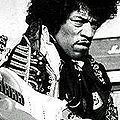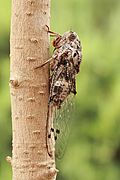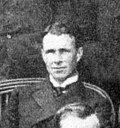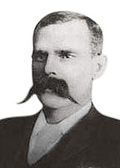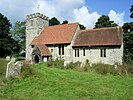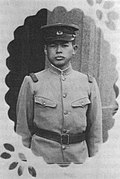Wikipedia:Today's featured article/March 2014
| << | Today's featured articles for March 2014 | >> | ||||
|---|---|---|---|---|---|---|
| Su | Mo | Tu | We | Th | Fr | Sa |
| 1 | ||||||
| 2 | 3 | 4 | 5 | 6 | 7 | 8 |
| 9 | 10 | 11 | 12 | 13 | 14 | 15 |
| 16 | 17 | 18 | 19 | 20 | 21 | 22 |
| 23 | 24 | 25 | 26 | 27 | 28 | 29 |
| 30 | 31 | |||||
March 1
Fuck is a 2005 American documentary film by Steve Anderson, which argues the titular word is key to discussions on freedom of speech and censorship. It provides perspectives from art, linguistics and society. Oxford English Dictionary editor Jesse Sheidlower, journalism analyst David Shaw, and linguists Reinhold Aman and Geoffrey Nunberg explain the term's evolution. Comedian Billy Connolly states it can be understood regardless of one's background, and musician Alanis Morissette says its taboo nature gives it power. The film contains the last interview of author Hunter S. Thompson before his suicide. It features animated sequences by Bill Plympton. The documentary was first screened at the AFI Film Festival at ArcLight Hollywood. The New York Times critic A. O. Scott called the film a battle between advocates of morality and supporters of freedom of expression; a review by the American Film Institute said this freedom "must extend to words that offend". Other reviewers criticized the film's length and repetitiveness. Its DVD was released in the US and the UK and used in university courses. (Full article...)
Recently featured: Starfish – "Terms of Endearment" (The X-Files) – John F. Bolt
March 2
Fakih Usman (1904–68) was an Indonesian Islamic leader and politician with the Masyumi Party. Born to a merchant and his wife in Gresik, Dutch East Indies, Fakih studied with his father and at a series of pesantren until the 1920s. In 1925 he became involved with the modernist Islamic organisation Muhammadiyah, rising quickly until he became the head of the Surabaya branch in 1938. When a group of Islamic organisations formed the Indonesian Islamic Assembly in 1937, Fakih became treasurer. He continued to be involved in politics and Islamic groups during the Japanese occupation and ensuing national revolution. In post-Revolution Indonesia, Fakih twice served as the Minister of Religious Affairs: under the Halim Cabinet in the State of the Republic of Indonesia in 1950, and in the national government during the Wilopo Cabinet from 1952 to 1953. While serving as minister of religious affairs, he oversaw educational and institutional reform. Growing in prominence within the Muhammadiyah, he was chosen as its chairman in late 1968, several days before his death. (Full article...)
Recently featured: F★CK – Starfish – "Terms of Endearment" (The X-Files)
March 3
Sevastopol was the last of three ships in the Petropavlovsk class of pre-dreadnought battleships built for the Imperial Russian Navy in the 1890s. Named for the siege of Sevastopol during the Crimean War, the ship was part of the Russian Pacific Fleet at Port Arthur, a Russian naval base acquired from China in 1898. One of the first ships to use Harvey nickel-steel armor and Popov radios, she displaced 11,854 long tons (12,044 t) at full load and was 369 feet (112.5 m) long overall, and mounted a main battery of four 12-inch (305 mm) guns in two twin turrets. She was launched on 1 June 1895 and completed in 1899. Sevastopol saw service in the Russo-Japanese War of 1904–05. Slightly damaged during a surprise attack on Port Arthur in early February, she later participated in several attempts to break out from the besieged port, including the Battle of the Yellow Sea, where she was damaged by several shells but managed to make it back to port with the remnants of the Russian Fleet. Immediately after the surrender of Port Arthur, Sevastopol was scuttled to prevent her capture by the Imperial Japanese Navy. The remains of the ship still lie outside the entrance to Port Arthur. (Full article...)
Recently featured: Fakih Usman – F★CK – Starfish
March 4
Jimi Hendrix (1942–1970) was an American musician, singer, and songwriter. Despite a relatively brief mainstream career spanning four years, he is widely regarded as one of the most influential electric guitarists in the history of popular music, and one of the most celebrated musicians of the 20th century. Born in Seattle, Washington, Hendrix began playing guitar at the age of 15. In 1963, he moved to Clarksville, Tennessee, and began playing gigs on the chitlin' circuit, eventually moving to England in late 1966 after being discovered by bassist Chas Chandler of the Animals. Within months, Hendrix had earned three UK top ten hits with the Jimi Hendrix Experience: "Hey Joe", "Purple Haze", and "The Wind Cries Mary". He achieved fame in the US after his performance at the Monterey Pop Festival in 1967, and in 1968 his third and final studio album, Electric Ladyland, reached number one in the US. The world's highest-paid performer, he headlined the Woodstock Festival in 1969 and the Isle of Wight Festival in 1970 before dying from barbiturate-related asphyxia on September 18, 1970, at the age of 27. (Full article...)
Recently featured: Russian battleship Sevastopol (1895) – Fakih Usman – F★CK
March 5
Terra Nova: Strike Force Centauri is a 1996 tactical first-person shooter video game developed and published by Looking Glass Technologies. Set in the 24th century, the game follows a faction of humans who colonize the Alpha Centauri star system to escape from a totalitarian Earth government. The player assumes the role of Nikola ap Io, the leader of an Alpha Centauri military unit, and undertakes missions against pirates and the Hegemony. Terra Nova has been cited as one of the first squad-oriented games with 3D graphics. Conceived by Looking Glass after the completion of their first game, Ultima Underworld: The Stygian Abyss, Terra Nova had a long and difficult development process. Critical reception was highly positive. Reviewers praised its tactical elements, and several compared it to the 1995 video game MechWarrior 2: 31st Century Combat. However, reception of its graphics was mixed, and many noted the game's steep system requirements. Despite critical acclaim and sales above 100,000 units, the game was a commercial failure as it did not recoup its development costs, and the company cancelled plans for a sequel. (Full article...)
Recently featured: Jimi Hendrix – Russian battleship Sevastopol (1895) – Fakih Usman
March 6
Gilbert Foliot (c. 1110 – 1187) was a medieval English monk and prelate, successively Abbot of Gloucester, Bishop of Hereford (Hereford Cathedral pictured) and Bishop of London. He became a monk at Cluny Abbey and was appointed Abbot of Gloucester in 1139. During the papal council at Reims in 1148, he was appointed Bishop of Hereford by Pope Eugene III. Despite promising not to recognise King Stephen, on returning to England Foliot nevertheless swore fealty to him, causing a temporary rift in his relationship with Henry of Anjou, the son of the Empress Matilda (Stephen's rival for the crown) who became King Henry II of England in 1154. Henry passed over Foliot for the position of Archbishop of Canterbury in 1162, appointing Thomas Becket instead. Foliot became Bishop of London in 1163, perhaps as compensation. During the great dispute between Becket and the king, Foliot took the king's side and was reviled by Becket and his supporters. Becket excommunicated Foliot on two occasions, the second of which precipitated the archbishop's martyrdom. Foliot often served as a royal judge, and was an active administrator and bishop. He was also a prolific letter writer. (Full article...)
Recently featured: Terra Nova: Strike Force Centauri – Jimi Hendrix – Russian battleship Sevastopol (1895)
March 7
Persoonia lanceolata, commonly known as lance-leaf geebung, is a shrub native to New South Wales in eastern Australia. It reaches 3 m (9.8 ft) in height and has smooth grey bark and bright green foliage. Its small yellow flowers grow on racemes and appear in the austral summer and autumn (January to April), followed by green fleshy fruit (known as drupes) which ripen the following spring (September to October). Within the genus Persoonia, Persoonia lanceolata belongs to the lanceolata group of 58 closely related species. It interbreeds with several other species found in its range. The species is usually found in dry sclerophyll forest on sandstone-based nutrient-deficient soil. It has adapted to a fire-prone environment; plants lost in bushfires can regenerate through a ground-stored seed bank. Seedlings mostly germinate within two years of fires. Several species of native bee of the genus Leioproctus pollinate the flowers. Swamp wallabies are a main consumer of its fruit, and the seeds are spread in wallaby scat. Its lifespan ranges from 25 to 60 years, though difficulties in propagation have seen low cultivation rates. (Full article...)
Recently featured: Gilbert Foliot – Terra Nova: Strike Force Centauri – Jimi Hendrix
March 8
Sholay is a 1975 action-adventure Indian Hindi film directed by Ramesh Sippy and produced by G. P. Sippy. Shot in the rocky terrain of Ramanagara (pictured), the film follows two criminals, Jai and Veeru (played by Amitabh Bachchan and Dharmendra), hired by a retired police officer (Sanjeev Kumar) to capture the ruthless dacoit Gabbar Singh (Amjad Khan). When first released, Sholay received negative critical reviews and a tepid commercial response, but favourable word-of-mouth publicity helped it to become a box office success. It broke records for continuous showings in many theatres across India, and ran for more than five years at Mumbai's Minerva theatre. The film drew heavily from the conventions of Westerns, and is a defining example of the masala film, which mixes several genres in one work. The film's dialogues and certain characters became extremely popular, contributing to numerous cultural memes and becoming part of India's daily vernacular. In 2002, Sholay ranked first in the British Film Institute's list of "Top 10 Indian Films". It was re-released to theatres in 3D in January 2014. (Full article...)
Recently featured: Persoonia lanceolata – Gilbert Foliot – Terra Nova: Strike Force Centauri
March 9
Faryl is the debut album by British mezzo-soprano Faryl Smith (pictured), who rose to fame on the second series of Britain's Got Talent. Released on 9 March 2009, it became the fastest-selling classical solo album in British chart history, selling 29,200 copies in the first week, higher than any other debut album of a classical singer. It was produced by Jon Cohen, and the backing music was provided by a 60-piece orchestra. As part of the album's promotion, Smith made numerous television and radio appearances and filmed a music video for "River of Light", a song set to The Blue Danube. Faryl reached number 4 in the UK Albums Chart, becoming the third album by a Britain's Got Talent contestant to reach the top ten in Britain. Smith subsequently embarked on a promotional tour in the US, where the album reached number 6 on the classical chart. Faryl was fairly well received by critics, who praised Smith's performances and Cohen's production, although there was criticism for the use of the orchestra and the song choices. As one of the ten best-selling classical albums in the UK in 2009, Faryl was nominated for a Classical BRIT Award in the album of the year category. (Full article...)
Recently featured: Sholay – Persoonia lanceolata – Gilbert Foliot
March 10
Aleeta curvicosta, commonly called the floury baker or floury miller, is a species of cicada native to the eastern coastline of Australia. Described in 1834 by Ernst Friedrich Germar, it is currently the only described species in the genus Aleeta. The floury baker's distinctive appearance and loud call make it popular with children. Both the common and genus name are derived from the white, flour-like filaments covering the adult body. Its body and eyes are generally brown with pale patterns. Its forewings have dark brown patches at the base of two of their apical cells. The female is larger than the male, and both grow larger in regions of higher rainfall. The male has a loud and complex call generated by the frequent buckling of ribbed tymbals and amplified by abdominal air sacs. The floury baker is solitary and occurs in low densities. Individuals emerge from the soil between November and February, and can be seen until May. They inhabit a variety of trees, with a preference for paperbark. The floury baker, which is a relatively poor flier, is preyed upon by cicada killer wasps and a wide variety of birds, and can succumb to a cicada-specific fungal disease. (Full article...)
Recently featured: Faryl – Sholay – Persoonia lanceolata
March 11
Early Netherlandish painting refers to the work of artists active in the Burgundian Netherlands during the 15th- and 16th-century Northern Renaissance. Their output follows the International Gothic style and begins approximately with Robert Campin and Jan van Eyck in the early 1420s, and lasts at least until the death of Gerard David in 1523. It represents the culmination of the northern European medieval artistic heritage. Early Netherlandish painting occurred during the height of Burgundian influence in Europe, when the Low Countries were renowned for high end crafts and luxury goods. The major figures include Campin, van Eyck, Rogier van der Weyden, Dieric Bouts, Petrus Christus, Hans Memling, Hugo van der Goes and Hieronymus Bosch. They made significant advances in natural representation and illusionism, and typically incorporate complex iconography. Their subjects were usually religious scenes or small portraits (Portrait of a Lady by van der Weyden pictured). The painted works are generally oil on panel, and may be single works or more complex altarpieces. The era is further noted for its sculpture, tapestries, illuminated manuscripts, stained glass and carved retables. (Full article...)
Recently featured: Aleeta curvicosta – Faryl – Sholay
March 12
Mitt Romney (born 1947) is an American businessman who was Governor of Massachusetts from 2003 to 2007 and the Republican nominee for President of the United States in the 2012 election. He was raised in Bloomfield Hills, Michigan, by his parents Lenore and George Romney, and spent two years in France as a Mormon missionary. He married Ann Davies in 1969, with whom he has had five children. After studying at Brigham Young and Harvard universities, he joined the management consultancy Bain & Company before co-founding the spin-off investment firm Bain Capital. He unsuccessfully ran as the Republican candidate in the 1994 Massachusetts election for Senate against Ted Kennedy. He relaunched his political career after running the Salt Lake Organizing Committee for the 2002 Winter Olympics. Elected Governor of Massachusetts in 2002, he helped enact state health care reform legislation, the first of its kind in America. Romney won the 2012 Republican presidential nomination. He was the first Mormon to be a major party presidential nominee. Romney lost to Barack Obama by 332–206 electoral votes and by 51–47 percent of the popular vote. (Full article...)
Recently featured: Early Netherlandish painting – Aleeta curvicosta – Faryl
March 13
The Charing Cross, Euston and Hampstead Railway (CCE&HR) was a railway company that constructed the deep-level underground railway that is now the central section of London's Northern line. Established in 1891, the company became a subsidiary of the Underground Electric Railways Company of London (UERL) in 1901. Various routes were planned, but a number were rejected by Parliament. Tunnels under Hampstead Heath were authorised, despite opposition by local residents who believed the tunnels would drain the heath of water and train vibrations would cause trees to collapse. When it opened in 1907, the CCE&HR's line served 16 stations (Tufnell Park pictured) and ran for 7.67 miles (12.34 km) in a pair of tunnels between its southern terminus at Charing Cross and two northern termini at Archway and Golders Green. Within a year of opening, it became apparent to the management and investors that the estimates of passenger numbers had been over-optimistic and the CCE&HR struggled financially for many years despite four extensions and connections to the City and South London Railway. In 1933 the CCE&HR and the rest of the UERL's operations were taken into public ownership. (Full article...)
Recently featured: Mitt Romney – Early Netherlandish painting – Aleeta curvicosta
March 14
Aeneas Mackintosh (1879–1916) was a British Antarctic explorer who commanded the Ross Sea party within Sir Ernest Shackleton's Imperial Trans-Antarctic Expedition, 1914–17. The party's mission was to support Shackleton's proposed transcontinental march by laying supply depots along the latter stages of the march's intended route. Confusing orders meant Mackintosh was uncertain of the timing of Shackleton's proposed march. Matters worsened when the Ross Sea party's ship, SY Aurora, was swept from its moorings during a gale, taking away much of the party's supplies and equipment. Despite these setbacks and further practical difficulties, Mackintosh's stranded party managed to carry out its depot-laying task to the full. Having reached safety, he and a companion lost their lives while attempting to return to the expedition's base camp by walking across unstable sea ice. Shackleton later commended the work of Mackintosh and his comrades, and equated the sacrifice of their lives to those given in the trenches during the First World War. However, his competence and leadership skills have been questioned by some polar historians. (Full article...)
Recently featured: Charing Cross, Euston and Hampstead Railway – Mitt Romney – Early Netherlandish painting
March 15
The 1st Provisional Marine Brigade was an ad-hoc unit of the United States Marine Corps (Marine Corps logo pictured) that existed periodically from 1912 to 1950. Formed for specific operations and not considered a "permanent" unit, the brigade saw five brief activations for service over forty years. First created for duty in Cuba following the Negro Rebellion, it was next activated in 1941 when it was hastily constructed from the 6th Marine Regiment to garrison Iceland after its occupation by British troops during World War II. The brigade participated in the Battle of Guam in the Pacific War, conducting an amphibious landing on the island and subduing resistance from Japanese troops. It was activated again in a brief organizational shift after the war. The brigade was hastily reformed in 1950 for service in the Korean War. It participated in a counterattack at Masan before reinforcing U.S. Army units during the Battle of Pusan Perimeter, and at the First and Second Battles of Naktong Bulge along the Naktong River. It was deactivated for the last time when it was merged with the 1st Marine Division. (Full article...)
Recently featured: Aeneas Mackintosh – Charing Cross, Euston and Hampstead Railway – Mitt Romney
March 16
Joseph W. Tkach (1927–1995) was an American pastor who was the appointed successor of Herbert W. Armstrong, founder of the Worldwide Church of God. Tkach was ordained as a minister in the church in 1957, and became President and Pastor General of the church upon the death of Armstrong in 1986. Tkach spearheaded a major doctrinal transformation of the Worldwide Church of God, abandoning Armstrong's unconventional doctrines and bringing the church into accord with mainstream evangelical Christianity. Changes included encouraging members to seek proper medical treatment while retaining faith in God as a healer, permitting interracial marriage, and allowing work on the Sabbath. The changes that he implemented stirred much controversy among those who continued to follow Armstrong's theology. Dissenters labeled the changes as heresy and many left to form new church organizations. His son, Joseph Tkach Jr., continued his work and in 1997 the Worldwide Church of God became a member of the National Association of Evangelicals. Within the mainstream Christian community, some have hailed Tkach's reforms, which brought a church from the fringe to orthodoxy, as unprecedented. (Full article...)
Recently featured: 1st Provisional Marine Brigade – Aeneas Mackintosh – Charing Cross, Euston and Hampstead Railway
March 17
The 1941 Atlantic hurricane season was a relatively inactive hurricane season, with only six known storms. Four of these attained hurricane status, and three became major hurricanes. The season had an abnormally late start; the first system formed on September 11, nearly three months after the official beginning date. The season was also short-lived, as all six storms developed in rapid succession (paths pictured). On September 23, three hurricanes existed simultaneously in the Atlantic basin. In total, the season resulted in about 63 fatalities and over $10 million in damages. The first and last storms of the season were largely insignificant, although the second, fourth, and fifth storms had considerable effects. Two hurricanes struck the United States: a major hurricane that struck Texas and Louisiana in late September, disrupting the Louisiana Maneuvers, and Hurricane Five, which made two landfalls in Florida, the first of which was near Miami at Category 2 intensity, inflicting widespread damage. Another major storm—Hurricane Four—traversed the Caribbean before striking the Nicaragua–Honduras border at Category 4 intensity, leaving 47 men dead at sea. (Full article...)
Recently featured: Joseph W. Tkach – 1st Provisional Marine Brigade – Aeneas Mackintosh
March 18
On 4 December 1893, the Shangani Patrol, comprising 34 soldiers of the British South Africa Company, was annihilated by over 3,000 Matabele warriors during the First Matabele War, in Rhodesia (modern-day Zimbabwe). Major Patrick Forbes was attempting to capture the Matabele King Lobengula. A patrol, headed by Major Allan Wilson (pictured), was scouting ahead on the north side of the Shangani River. When Wilson's patrol moved in to capture Lobengula, it was ambushed by Matabele riflemen and warriors near the king's wagon. Surrounded and outnumbered about a hundred-fold, the patrol made a last stand as three of its number rode back to the river for reinforcements – without success as the Shangani was now in flood and Forbes was also involved in a skirmish. After fighting to the last cartridge, and killing over ten times their own number, Wilson and his men were annihilated. The patrol's members were regarded as national heroes for endeavour in the face of insurmountable odds. The anniversary of the battle became an annual public holiday in Rhodesia in 1895, and was an official non-work day until 1920. A film depicting the episode, Shangani Patrol, was released in 1970. (Full article...)
Recently featured: 1941 Atlantic hurricane season – Joseph W. Tkach – 1st Provisional Marine Brigade
March 19
North Road was a football stadium and cricket field in Newton Heath, Manchester, England. It was the first home of Manchester United Football Club, then known as Newton Heath Lancashire and Yorkshire Railway Football Club. The club was formed in 1878 at the request of the railway company's employees at its carriage and wagon works, and the ground (which was owned by Manchester Cathedral) adjoined the works. Initially the ground consisted only of the pitch, around which an estimated 12,000 spectators could congregate, and it was often clouded by steam from passing trains. Players had to get changed at a nearby public house. The addition of stands in 1891 increased the capacity to about 15,000. The football club signed its first professional players in 1886 and began to break from its sponsoring railway company, but without the company's financial support it was unable to afford the rent on the ground and was evicted. In 1893, the club moved to a new ground at Bank Street, Clayton. The North Road site is now part of the North Manchester Business Park, having previously been used as playing fields and as the site of a school. (Full article...)
Recently featured: Shangani Patrol – 1941 Atlantic hurricane season – Joseph W. Tkach
March 20
Mike Jackson (born 1944) is a retired British Army officer and one of its most high-profile generals since the Second World War. Originally commissioned into the Intelligence Corps in 1963, he transferred to the Parachute Regiment. On the first of his tours of duty in Northern Ireland with the regiment, he was present as an adjutant at the events of Bloody Sunday (1972), when soldiers opened fire on protesters, killing 13 people. He was assigned to a staff post at the Ministry of Defence in 1982 before assuming command of the 1st Battalion, Parachute Regiment, in 1984. Jackson served his first tour in the Balkans in 1994, commanding a multi-national division of the Implementation Force, and was appointed commander of NATO's Allied Rapid Reaction Corps in 1997. In this role, he controversially refused to obey an order from American General Wesley Clark (his immediate superior in the NATO chain of command during the Kosovo War) to block the runways of Pristina Airport. Upon his return to the UK, Jackson was promoted to full general and later served as Chief of the General Staff, the professional head of the British Army, from 2003 to 2006. (Full article...)
Recently featured: North Road (football ground) – Shangani Patrol – 1941 Atlantic hurricane season
March 21
Rani Mukerji (born 1978) is an Indian film actress. Through her successful Bollywood acting career, she has become one of the most high-profile celebrities in India. Mukerji has received seven Filmfare Awards, and her film roles have been cited as a significant departure from the traditional portrayal of women in mainstream Hindi cinema. Mukerji began a full-time career in film with Raja Ki Aayegi Baraat in 1997 and had her first major success with the 1998 romance Kuch Kuch Hota Hai. In 2002 she was acclaimed for her role in the relationship drama Saathiya, and by the year 2004 she had established herself as a leading actress of Bollywood with roles in the romantic comedy Hum Tum and the dramas Yuva and Veer-Zaara. She achieved further success for her leading roles in Black (2005) and Kabhi Alvida Naa Kehna (2006). After starring in a series of unsuccessful films, she featured in the successful thrillers No One Killed Jessica (2011) and Talaash: The Answer Lies Within (2012). In addition to acting in films, Mukerji has been actively involved with several humanitarian causes and is vocal about issues faced by women and children. (Full article...)
Recently featured: Mike Jackson – North Road (football ground) – Shangani Patrol
March 22
Alloxylon flammeum, commonly known as the Queensland tree waratah or red silky oak, is a medium-sized tree of the family Proteaceae found in the Queensland tropical rain forests. It has shiny green elliptical leaves up to 18 cm (7.2 in) long, and prominent orange-red inflorescences that appear from August to October, followed by rectangular woody seed pods that ripen in February and March. Juvenile plants have large (up to 25 cm (10 in) long) deeply lobed pinnate leaves. Previously known as Oreocallis wickhamii, the initial specimen turned out to be a different species to the one cultivated and hence a new scientific name was required. Described formally in 1991, A. flammeum was designated the type species of the genus Alloxylon. Alloxylon flammeum is a canopy or emergent tree of the Mabi rainforest community of north Queensland. It is readily adaptable to cultivation, and prefers a site with good drainage. The tree's terminal tubular flowers indicate that the species is pollinated by birds. It is listed nationally as vulnerable under the Australian Environment Protection and Biodiversity Conservation Act 1999 as most of its habitat has been cleared for agriculture and logging. (Full article...)
Recently featured: Rani Mukerji – Mike Jackson – North Road (football ground)
March 23
King's Highway 416 is a 400-series highway in the Canadian province of Ontario that connects the Trans-Canada Highway (Highway 417) in Ottawa with Highway 401 between Brockville and Cornwall. The 76.4-kilometre-long (47.5 mi) freeway is part of an important trade corridor between New York and Eastern Ontario. It passes through a largely rural area, except near its northern terminus where it enters the suburbs of Ottawa (approach to Ottawa pictured). It had two distinct construction phases. Highway 416 "North" was a 21-kilometre (13 mi) freeway starting from an interchange at Highway 417 and bypassing the original route of Highway 16 into Ottawa along a new right-of-way. Highway 416 "South" was the twinning of 57 kilometres (35 mi) of Highway 16 New—a two-lane expressway bypassing the original highway that was constructed throughout the 1970s and finished in 1983—and the construction of a new interchange with Highway 401. Sections of both opened throughout the late 1990s. Highway 416 was commemorated as the Veterans Memorial Highway on the 54th anniversary of D-Day in 1998. The final link was officially opened by a World War I veteran and local officials on September 23, 1999. (Full article...)
Recently featured: Alloxylon flammeum – Rani Mukerji – Mike Jackson
March 24
The Kennedy half dollar is a fifty cent coin issued by the U.S. Mint. Intended as a memorial to the assassinated President John F. Kennedy, it was authorized by Congress just over a month after his death. Use of existing works by Mint sculptors Gilroy Roberts and Frank Gasparro allowed dies to be prepared quickly, and striking of the new coins began in January 1964. The coins vanished from circulation upon their release in March 1964 due to collectors, hoarders, and those interested in a memento of the late president. Although the Mint greatly increased production, they still failed to circulate. Starting with 1965-dated pieces, the percentage of fine silver was reduced from 90% to 40% (silver clad), but even this change failed to restore the coin to circulation. In 1971, silver was eliminated entirely. A special design for the reverse of the half dollar was issued for the United States Bicentennial and was struck in 1975 and 1976. Even though ample supplies of half dollars are now available, their circulation is extremely limited. Since 2002, Kennedy half dollars have only been struck to satisfy the demand from collectors, and are available at a premium through the Mint. (Full article...)
Recently featured: Ontario Highway 416 – Alloxylon flammeum – Rani Mukerji
March 25
The Australian cricketer Neil Harvey toured England in 1948 as a member of "The Invincibles" – so-called as they were undefeated in their 34 tour matches, an unprecedented feat. Aged 19, Harvey (pictured in 1953) was the youngest player of the touring party. An attacking left-handed middle-order batsman who was the youngest Australian to score a Test century, he struggled early in the tour. After being omitted from the first-choice team in the first half of the tour, Harvey's performances improved with his increasing familiarity with local conditions and he was called into the team for the Fourth Test at Headingley. Harvey scored 112 in a first innings counter-attack to keep Australia in contention, and hit the winning runs in the second innings. He retained his place for the Fifth Test, ending the series with 133 runs at a batting average of 66.50. Overall, Harvey was sixth on the tour team's run-scoring aggregates and seventh in the batting averages. Harvey was an acrobatic fielder, regarded as the best in the Australian team, and took several acclaimed catches throughout the tour. He took 17 catches for the tour and claimed a solitary wicket with his occasional off spin. (Full article...)
Recently featured: Kennedy half dollar – Ontario Highway 416 – Alloxylon flammeum
March 26
Panellus stipticus is a species of fungus in the family Mycenaceae, and the type species of the genus Panellus. A common and widely distributed species, it is found in Asia, Australasia, Europe, and North America, growing in groups or dense overlapping clusters on the logs, stumps, and trunks of deciduous trees. During the development of the fruit bodies, the mushrooms start out as tiny white knobs, which develop into fan- or kidney-shaped caps up to 3 cm (1.2 in) broad. The caps are orange-yellow to brownish, and attached to the decaying wood by short stubby stalks. The fungus was first described by French mycologist Jean Bulliard in 1783 and was given its current scientific name in 1879. It is one of several dozen bioluminescent species of fungi. Strains from eastern North America are typically bioluminescent, but those from elsewhere are not. The luminescence is localized to the edges of the gills and the junction of the gills with the stem and cap. The luminescent glow of this and other fungi inspired the term foxfire, coined by early settlers in eastern and southern North America. Modern research has probed the fungus's ability to detoxify various environmental pollutants. (Full article...)
Recently featured: Neil Harvey with the Australian cricket team in England in 1948 – Kennedy half dollar – Ontario Highway 416
March 27
Spiderland is the second and final studio album by American rock band Slint (lead singer Brian McMahan pictured). It was released on March 27, 1991, through Touch and Go Records. Featuring dramatically alternating dynamics and vocals ranging from spoken word to shouting, the album contains narrative lyrics that emphasize alienation. Spiderland was Slint's first release on Touch and Go, and the group's last record. The title originated from McMahan's younger brother, who thought that the record sounded "spidery". Although Spiderland was not widely recognized on its initial release, it eventually sold more than 50,000 copies and became a landmark album in underground music after Slint broke up. Its popularity increased in part after the appearance of the track "Good Morning, Captain" on the soundtrack to the 1995 film Kids. The album has been highly influential on the styles of many bands in the post-rock and math rock genres, including Mogwai and Godspeed You! Black Emperor, and has been named a favorite of several indie rock musicians. In 2007, Slint reunited for a tour consisting of performances of Spiderland in its entirety. (Full article...)
Recently featured: Panellus stipticus – Neil Harvey with the Australian cricket team in England in 1948 – Kennedy half dollar
March 28
Nikki Fernandez and Paulo are fictional minor characters on the ABC drama television series Lost, played by American actress Kiele Sanchez and Brazilian actor Rodrigo Santoro (pictured). The show chronicles the lives of over forty people after their plane crashes on a remote island somewhere in the south Pacific. Before boarding the plane, Paulo is a con artist working with his girlfriend Nikki. He murders a wealthy television executive, stealing the man's bag of diamonds with Nikki. The producers of the show were often asked what the rest of the plane-crash survivors were doing because the show only focuses on approximately fifteen of the survivors, and the characters of Nikki and Paulo were created in response. The couple is introduced early in the third season. Reaction to the characters was generally negative because of their abrupt introduction. Lost's show runner Damon Lindelof even acknowledged that the couple are "universally despised" by fans. As a result of this, the couple was killed off later in the same season. Both Nikki and Paulo are buried alive, with the diamonds, when they are thought to be dead after being paralyzed by venomous spiders. (Full article...)
Recently featured: Spiderland – Panellus stipticus – Neil Harvey with the Australian cricket team in England in 1948
March 29
SS Pennsylvanian was a cargo ship built in 1913 for the American-Hawaiian Steamship Company. She was employed in inter-coastal service via the Isthmus of Tehuantepec and the Panama Canal after it opened. Pennsylvanian was one of the first two steamships to travel eastbound through the canal when it opened in August 1914. During World War I she was requisitioned by the U.S. Navy and commissioned as USS Pennsylvanian (ID-3511) in September 1918, but renamed two months later to USS Scranton (pictured). She carried cargo and animals to France, and returned American troops after the Armistice in 1918. After her Navy service ended in 1919, her original name of Pennsylvanian was restored and she resumed relatively uneventful cargo service for her original owners over the next twenty years. Early in World War II, the ship was requisitioned by the War Shipping Administration, and shipped cargo on New York – Caribbean routes and transatlantic routes. In mid-July 1944, Pennsylvanian was scuttled as part of the breakwater for one of the Mulberry artificial harbors built to support the Normandy Invasion. (Full article...)
Recently featured: Nikki and Paulo – Spiderland – Panellus stipticus
March 30
Wormshill is a small village and civil parish within the Borough of Maidstone, Kent, England. It lies on an exposed high point of the North Downs, 8 miles (13 km) east of Maidstone and within the Kent Downs Area of Outstanding Natural Beauty. Archaeological and toponymic evidence of Wormshill's existence predates its appearance in the Domesday survey of 1086. Its name derived from the Anglo-Saxon god Wōden and means "Woden's Hill". The village contains a number of heritage-listed buildings, which include a Norman church (St Giles, Wormshill, pictured), a public house and one of the oldest surviving post office buildings in the United Kingdom. The Bredgar and Wormshill Light Railway runs between two small stations in nearby woodland. The fields and woodland surrounding Wormshill have changed little in the past 500 years, and the village itself remains rural with a low population density compared to the national average. Because of restrictions on development, building in the village has been scant since the 1960s and 1970s. The population of 200 is a mixture of agricultural workers employed by local farms and professionals who commute to nearby towns. (Full article...)
Recently featured: SS Pennsylvanian – Nikki and Paulo – Spiderland
March 31
Paul Nobuo Tatsuguchi (1911–1943) was a surgeon in the Imperial Japanese Army during World War II. A devout Seventh-day Adventist, Tatsuguchi studied medicine and was licensed as a physician in the United States. He returned to Japan to practice medicine at the Tokyo Adventist Sanitarium. In 1941, he was conscripted as an acting medical officer, and was later sent to Attu Island, Alaska, which had been occupied by Japanese forces in October 1942. The U.S. Army landed on the island in May 1943, and throughout the resulting battle, Tatsuguchi kept a diary recording the events of the battle and his struggle to care for the wounded in his field hospital. He was killed on the battle's final day. His diary was recovered and translated, and copies were widely disseminated in the US after the battle. The American public was intrigued by a Christian, American-trained doctor serving with Japanese forces and by his apparent participation in assisting with the deaths of wounded Japanese soldiers. Excerpts from the diary have been widely quoted in Western historical accounts of the battle, especially his final entry in which he recorded a farewell message to his family. (Full article...)
Recently featured: Wormshill – SS Pennsylvanian – Nikki and Paulo



